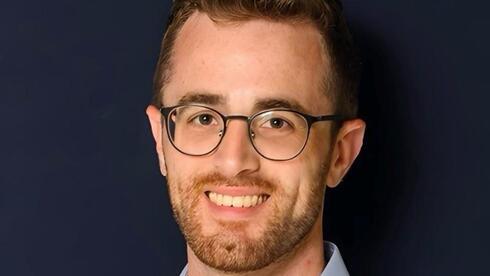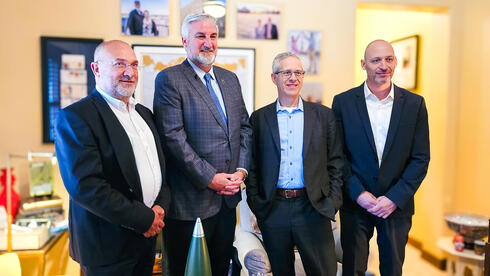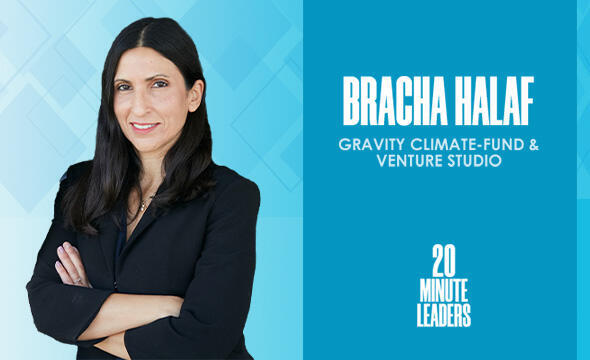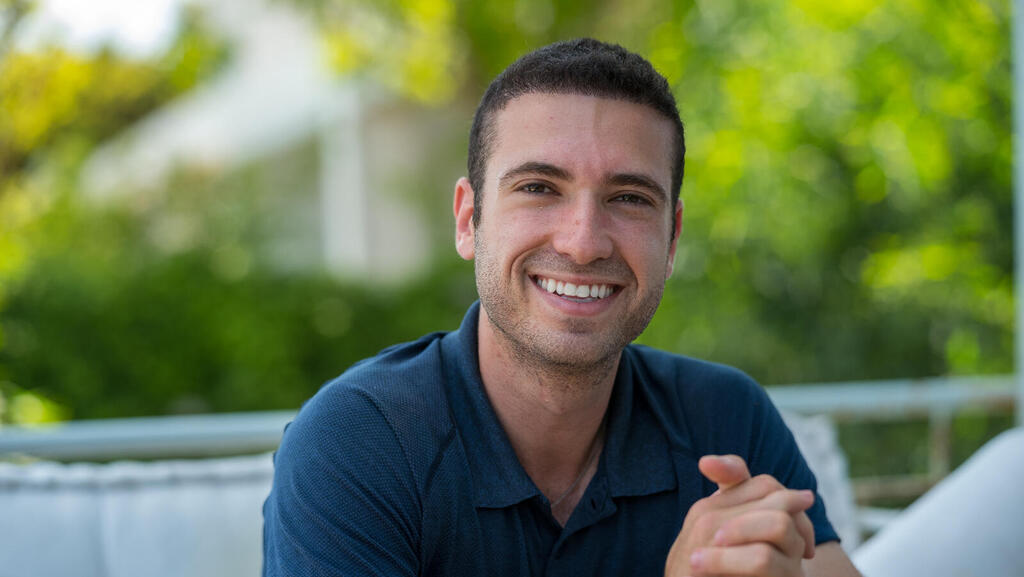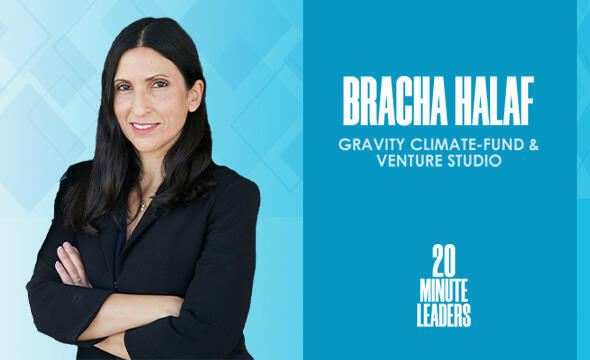
20-Minute Leaders
“Whatever your capabilities are, you can apply it to climate technologies.”
Climatetech is so vast that anyone can get involved in the sector, says Bracha Halaf, co-founder and managing partner of Gravity Climate Fund.
The field of climate technology is so vast that anyone can find a way to apply their abilities and interests to the topic, says Bracha Halaf, co-founder and managing partner of Gravity Climate Fund. When she was chief scientist at the Ministry of Energy, she saw many technologies in various stages, but she realized that entrepreneurs had a hard time navigating all of the industry’s challenges to create successful companies. So Halaf found a partner with entrepreneurial experience and created a VC to guide founders through launching climate-focused companies. These can involve improving current technology or inventing something new. She shares that previously, the market wasn’t ready, but she sees that the world is at a turning point on climate change. Halaf explains that she gets excited by science and has the mindset of an engineer. She likes to find the problems and come up with creative ways to fix them.
You are the co-founder and managing partner at Gravity Climate Fund and Venture Studio, and you have a PhD in biophysics from Weizmann Institute. Tell me a little bit about your connection to biophysics, chemical engineering.
The fact that I ended up having a PhD from Weizmann Institute means that it goes without saying that I have the ability to get excited by science. My modus operandi is more of an engineer. When I look at things, I want to identify the problems and then find creative solutions to resolve those. The way that I access challenges is how to make the most efficient solutions that are really needed.
You've been in the venture space for some time now. Tell me a little bit about venture for you from an engineering mindset of solving meaningful problems.
In the past couple of years, I spent my time as a principal in Qure Ventures, which is a digital health-focused fund. This is very, very different from my previous position in the Ministry of Energy where I granted the researchers and the academic institute and startups at their early stages, but it was never from the mindset of financial objectives. In the VC world, it's all about that. To make really good and viable startups in the climate space, there are so many things that have to be taken into account: you have a very strong technology, you have a mindset of commercializing it from the very beginning, you are aware of all the regulatory framework that you are entering, you have very creative ways and different ways to finance your journey throughout the way, which changes through time. In most cases, you can't find an entrepreneur who's just starting a venture who has all these capabilities in-house and within only himself.
When I thought about making a VC that will be really instrumental in helping startups grow and grow the right way, I first wanted to find the best partner for me for this journey. I lack the entrepreneurship background and the actual business experience, which is so much needed in this space. That's how I came to meet my co-founder, Zafrir Yoeli. He is the co-founder of Enlight Renewable Energy. Bringing in Zafrir's experience, together with my experience, actually answers so many things that entrepreneurs in the early stages of venture building in the climate space really need.
What did you learn acting as the chief scientist at the Ministry of Energy that is relevant to us in the tech world?
I was able to see so many technologies and in really different stages of their lifetime. After seeing so many technologies, seeing the journeys that researchers have to go through—through the actual basic research to building a valid prototype, finding the right places to make the first pilot and the first demonstration, finding their POCs partners for making this, and then later on thinking about the right business model to incorporate it into the industry—there are so many challenges that entrepreneurs have to go through in this space in particular. I think that this is something that caused a lot of the bad reputation that CleanTech had at the time. There were many early-stage companies that didn't reach maturation because of all the challenges that they had to face. And because, in the end, there was not good reception in the market for such technologies.
But we are now really at a turning point with everything that has to do with climate change. I think that there is no question about whether or not it's happening. There is no question of whether or not we need more implementation of existing technologies. But what is more interesting is that there is no question that we need to invent new technologies. This part is where I think the VCs, such as Gravity, are coming into action. Entrepreneurs need some experts and some people that are veterans from this industry who can guide them from the very initial inception stage.
If I was a young entrepreneur excited to go into climate tech and tackle something that we all need to be worried about, what are some things that I should be looking into?
When we are talking about climate change and climate technologies, we, in Gravity, look at three different angles. The first one is mitigation. In mitigation, there is a way to reduce the actual emissions of CO2. Then of course, in order to use renewable energy, you need to add storage into this. If you look at the transportation sector: for EVs, for private vehicles, yes, there's no problem in carrying batteries, but when you go into trucks then you have to find another way. Everything that has to do with energy generation, energy storage, and then energy management. We need to find ways to manage our demand for the energy in a much more clever way so we won't need to produce so much energy. Everything that has to do with really mitigating and reducing the emissions, this is in one angle.
Another angle comes from all the things that you can do with the CO2 that was already emitted, which is to capture it and then you can even use it to create new materials and fuels. So it's a way of recycling fuels. That's a great solution for the aviation industry because they cannot use batteries. In the new era of energy, you need a lot of materials, and the way to get them is through mining and through utilizing resources on our planet. You can do that in a much more efficient way, a much more sustainable way that needs a lot less water and energy in order to produce those materials.
Something that we shouldn't forget about is the adaptation. Because regardless of how successful our technologies are going to be and how much they can reduce the emissions to the atmosphere, we are facing very big and critical effects of climate change. There is a different risk assessment that you have to bring into all industries regarding their supply chain that will be affected by climate change. There is the need for more accurate sensing of climate conditions in different locations. There's also things that have to do with just adapting to the actual extra demand that energy will be needed. You need to find much better ways to build the buildings, better insulation and such. And more importantly is the way to manage the electricity demand in those buildings and to use technologies such as fuel cells, hydrogen storage, and local energy generation on the walls of the buildings. There are so many ways that can be done.
On top of all of this, there comes the digitization aspect. To every hardware that you can think about in climate, you can make it much more efficient, you can scale it much more rapidly. That can be either using AI and machine learning for energy management. Or it can be using prediction models, together with sensors; we'll be able to predict what the temperature will be in the next day, and then to be prepared for that in terms of energy generation.
I think that whoever you are and whatever your capabilities are and your interests are, you can apply it to some climate technologies, if you wish to. I'm really happy to see entrepreneurs coming from all backgrounds, and especially the ones that come from elite Israeli technological units such as 8200. They, these days, really prefer to come and establish climate tech startups and not the automatic way of thinking of going to cyber or FinTech. They really want to do something impactful. I think they have the capacity to do that with the right guidance.
Michael Matias, Forbes 30 Under 30, is a Venture Fellow at Innovation Endeavors as well as investment Venture Partner at Secret Chord and J-Ventures. He studies Artificial Intelligence and Human-Computer Interaction at Stanford University, and was an engineer at Hippo Insurance. Matias previously served as an officer in the 8200 unit. 20MinuteLeaders is a tech entrepreneurship interview series featuring one-on-one interviews with fascinating founders, innovators and thought leaders sharing their journeys and experiences.
Contributing editors: Michael Matias, Megan Ryan





